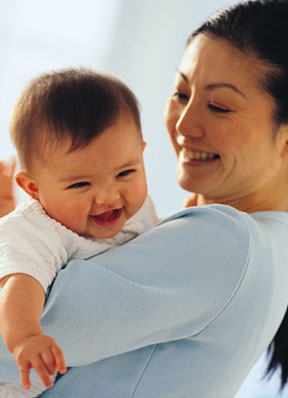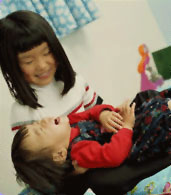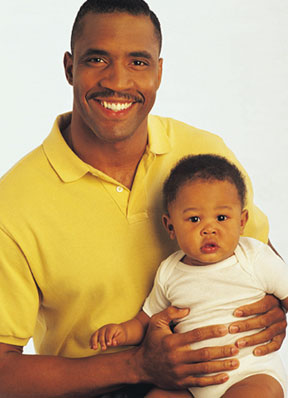
PPD
Facts
 PPD is type of major depression that affects
about 1 in 10 new mothers within the first year after they give
birth. Usually starts shortly after delivery. In the situations
where PPD goes undetected, undiagnosed, or untreated not only
the mothers suffer also a new infant and other children that she
might have. In addition, child is at risk of developing emotional,
behavioral and cognitive problems. Postpartum depression usually
lasts about twelve months.
PPD is type of major depression that affects
about 1 in 10 new mothers within the first year after they give
birth. Usually starts shortly after delivery. In the situations
where PPD goes undetected, undiagnosed, or untreated not only
the mothers suffer also a new infant and other children that she
might have. In addition, child is at risk of developing emotional,
behavioral and cognitive problems. Postpartum depression usually
lasts about twelve months.
Who
is affected?
Mother
The
postpartum period is a time of extreme vulnerability to depression.
Postpartum
depression (PPD) frequently strikes without warning in women without
any past emotional problems, without any history of depression
and without any complications in pregnancy. Postpartum depression
affects mothers who are in very satisfying marriages as well as
those who are single, or have problematic relationship with the
father of the child . It affects women who had easy pregnancies
and deliveries, as well as women who suffered prolonged, complicated
labors and caesarean section deliveries. Symptoms of PPD may appear
at any time after delivery, often after the woman has returned
home from the hospital. It may happen after the first, third,
or even fourth birth. A new mother can have this condition regardless
of her age, socioeconomic status, or the number of children she
has borne.
Child
PPD
is not only health concern related to the women’s health,
but also health, development and well-being of the children. Infants
of mothers with postpartum depression are at risk for emotional
and social difficulties in life. Maternal depression can affect
the mother's ability to respond sensitively to her infant's needs.
A depressed mother is less likely to provide her children with
appropriate levels of stimulation and to express positive affect.
Research generally shows that children who receive warm and responsive
care giving from the moment of birth and are securely attached
to their caregivers cope with difficult times more easily when
they are older. They are more curious, get along better with other
children, and perform better in school than those who are less
securely attached.
Causes
of PPD
(Why some women get PPD)
Postpartum
depression is a complex mixture of biological, emotional, and
behavioral changes. The exact cause of this condition is still
unknown. Postpartum depression is representing the most frequent
form of maternal morbidity following delivery. The cause of PPD
is not clear yet, and research suggest that hormonal changes and
social factors, the nature of relationship with baby’s father
can cause emotional strain that can trigger onset of PPD.
During
pregnancy, the body clock releases hormones (cortisol, neorothropin)
that increase the body’s ability to deal with the added
stress of having a baby. These hormones take their toll, by lowering
reserves of serotonin, the hormone associated with wellness and
mood. During the third trimester and shortly after birth, serotonin
levels are as low as those found in people with major depression.
Thyroid
levels may also drop sharply after birth. A thyroid deficiency
can produce symptoms that mimic depression, such as mood swings,
severe agitation, fatigue, insomnia, and anxiety. Simple thyroid
tests can determine if this condition is causing a woman's postpartum
depression.
Risk
factors for postpartum depression
In
most of the cases, PPD is preventable and early detection of risk
factors can lead to early diagnosis and early treatment. Luck
of social support, adverse and stressful life events like loss
of job, financial difficulties, low SES, housing difficulties,
marital problems, partners abuse, recent immigration status, health
insurance status, family’s desire and expectation of having
a son, are some of the social risk factors for developing PPD.
Other risk factors are young and/or single mother, history of
mental illness, history of substance abuse, vulnerability personality
trait, a major life changes at same time as birth of the baby.
Medical risk factors for PPD are pregnancy-induced high blood
pressure or previous post partum difficulties, complications during
labor, problems with baby’s health.
The
risk factors for postpartum depression are:
• Young and/or single mother
• History of mental illness
• History of substance abuse
• Vulnerability personality trait
• Stressful life events like: loss of job, financial difficulties,
housing difficulties, marital problems, partners/ father of the
child abuse, recent immigration status, health insurance status,
families desire and expectation of having a son
• Low SES (socioeconomic status)
• Previous risk pregnancies (pregnancy induced high blood
pressure ) or previous post partum difficulties
• Complications during labor
• Problems with baby’s health
• A major life changes at same time as birth of the baby
• Luck of support
• Luck of help with baby
Symptoms
Women
can experience more then one symptom of PPD with the range of
severity. Symptomatology of postpartum  depression
includes:
depression
includes:
Emotional symptoms:
• Increased/excessive crying and irritability
• Uncontrollable mood swings
• Hopelessness and sadness
• Felling overwhelmed or unable to cope
• Fear of being alone
• Fear of hurting the baby, other children, husband or herself
• Guilt, shame or worthlessness
• Fear of losing control or "going crazy”
• Intrusive thoughts
Physical symptoms:
• Fatigue, exhausting, sluggishness
• Sleep and appetite disturbances that are not related to
the care of the baby
• Hyperventilation
• Chest pain and heart palpitations
• Headaches and body aches like neck, shoulder, or back
pain
Behavioral symptoms:
• Poor self-care
• Decreased energy and motivation
• Luck of interest in the baby or too much concern about
the baby’s well being
• Loss of interest
• Loss of pleasure in activities including interest for
sex
• Inability to think clearly
• Inability to make decisions
• Withdrawal or isolation from the family and friends
• Exaggerated highs and/or lows
Impact of postpartum depression on child
development 
A literature research suggests
that a mother's attitude and behavior toward her infant significantly
affect mother-infant bonding and infant well-being and development.
Postpartum depression may negatively affect these mother-infant
interactions. Mothers with postpartum depression are more likely
to express negative attitudes about their infant and to view their
infant as more demanding or difficult. Calming down an infant
and helping infants learn to calm themselves is a very difficult
task, and depressed mothers may find it especially difficult.
She may be less able to respond to her child’s needs. Depressed
mothers are showing difficulties engaging with the infant, being
either more withdrawn or inappropriately intrusive, and more commonly
express negative facial interactions. A new mother’s attention
to her newborn is particularly important immediately following
birth because the first year of life is a critical time in child’s
cognitive development.
Research
has shown that the more depressed a new mother is the greater
is the delay in the infant’s development. These early disruptions
in mother-infant bonding may have a profound impact on child development.
Maternal depression is associated with long-term cognitive, emotional,
and behavioral problems in the child. Children of mothers with
postpartum depression are more likely to show behavioral problems;
sleep and eating difficulties, temper tantrums, hyperactivity,
and delays in cognitive development, emotional and social dysfunction,
and early onset of depressive illness than children whose mothers
are not depressed. Postpartum depression is associated with disturbances
in the mother-infant relationship, which in turn have an adverse
impact on the course of child cognitive and emotional development.
Cognitive
development in the context of postnatal depression is adversely
affected, especially among male children and socioeconomically
disadvantaged groups. The children at 18 months,
of mothers with PPD tend to have insecure attachments and to perform
significantly less well on cognitive tasks than children of well
mothers, especially the boys. Also, the boys show a high level
of frank behavioural disturbance at 5 years of age.
Paternal
depression
The effects of postpartum
depression can also affect the child and the father significantly.
A mother's marriage can also become severely strained when dealing
with a postpartum depression. Often, husbands/partners/fathers
feeling anxious and helpless, do not understand what is going
wrong, or what the source of the depression in women is. The problems
created by the illness can further complicate communication between
partners. There is some indication that men also experience depression
after the birth of a child, and that paternal depression is linked
to maternal depression. During the first postpartum year, the
incidence of paternal depression ranged. from 1.2% to 25.5% in
community samples, and from 24% to 50% among men whose wives were
experiencing postpartum depression Maternal depression was consideration
of co-occurrence of depression in couples. Maternal PPD is identified
as the strongest predictor of paternal depression during the postpartum
period . Family units as a whole can experience isolation .
-Top-